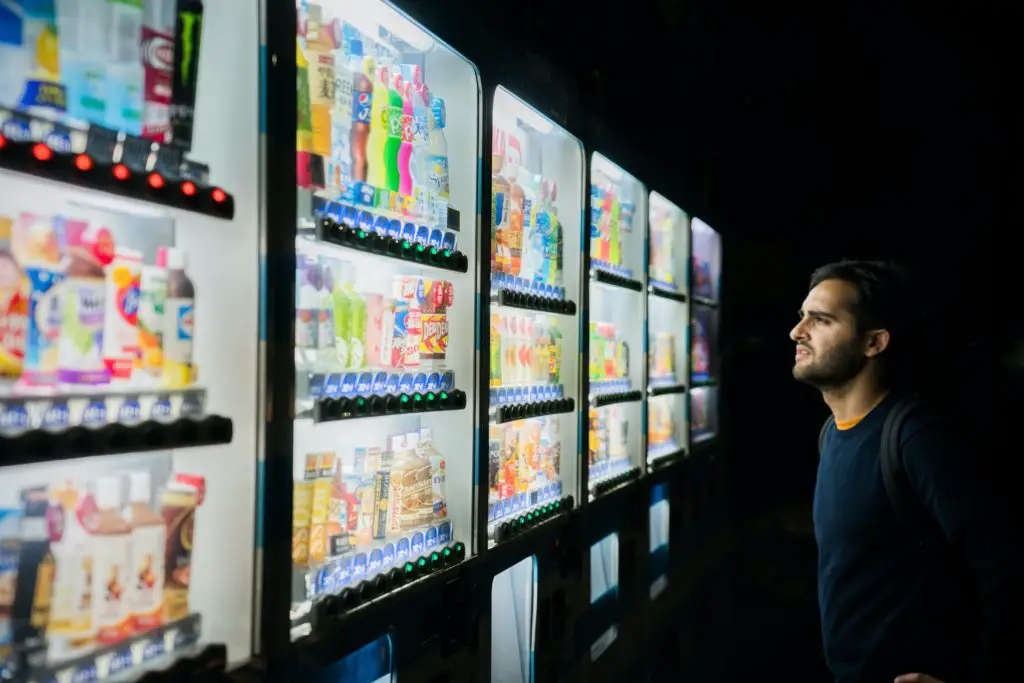Vending machines today sell products besides soda and chips, like electronics and prescription medications. It is viable to pursue it as a full-time job or as a profitable side business. You might be wondering; why would I open a vending machine company? The sector is flourishing and rapidly growing. If your favorite part of eating has ever been picking a meal out of a neatly organized display in front of you, vending machine industry might be for you.

Here are some steps to follow if you want to start your own vending machine business:
1. Finding out the right products
Vending machines offer more than just snacks and cold drinks. Nowadays, you can put a whole variety of things into it, from dairy products to medicines, from snacks to hot beverages, and in some states, tobacco is also legal. Vending machines stocked with snacks in schools and colleges could be a great idea because schools want their students to eat well. In general, you can look into your interests and choose the appropriate stream.
2. Look out for the right location
When first starting out, make sure that your machine is not placed in a mall full of restaurants. Look for business spaces near you so that the employees do not have to drive far for upkeep. During the commercial space search process, you will contact several businesses and make contacts with various business owners. To know where you might be allowed to place your device, you can also get in touch with your neighborhood chamber of commerce. To have the machines put in schools, contact someone who works on large-scale management initiatives.
3. Find the machine that matches your business
There are mainly three different categories of vending machines bulk, maintenance, and electronic vending machines.
Bulk vending machines are low-maintenance and require a small initial investment of roughly $50 to $200. They essentially contain one commodity in bulk.
Mechanical vending machines, as the name implies, are mechanically driven and do not require electricity or batteries, lowering the cost of operation to practically zero. The initial investment is roughly $2000, however, they are often more profitable than bulk vending machines.
Electronic vending machines require a higher initial investment of $3000 but yield the highest profit. They are the most up-to-date and can also accept credit card payments, allowing them to reach a bigger audience. Because not everyone carries cash these days, it is incredibly effective in today’s world.
4. Choosing an appropriate market
Look out for spaces that are appropriate for your vending machine-like your vending machine should be located in the most convenient location for the clients you wish to serve. Vending machines selling microwavable foods and other meal-like products, for example, perform well in environments where people spend a lot of time but lack the capacity to cook, such as workplaces, hospitals, and universities
Snack vending machines in the workplace are also useful. If you are interested in developing such relationships, vending machines that sell novelty items like little candies can succeed in small enterprises.
Finally, vending machines selling medications or electronics are appropriate for airports, rest stops on highways, and railway stations. Because these devices are necessities for travelers, they may have a high-profit margin.
5. Stocking the vending machine
You’re well on your way to starting a vending machine company after you’ve decided on a machine. Then you must stock it with items.
Product selection is a great strategy to boost sales. Consider local, site-specific demands before stocking goods based on bigger food and beverage trends. To be safe, do not over-order merchandise initially, and change your offerings as demand dictates.
Drinks will make up the majority of your revenue if you decide to provide integrated food and beverage services in your vending machine business. It’s something to consider as the beverage market swings away from soda and toward coffee, flavored water, and healthier beverages like coconut water.
Develop ties with wholesale suppliers to obtain the lowest cost per unit when it comes to food stocking in general. This will help you gain a high profit in the long run.
6. Buying your first vending machine
One of the fastest ways to get started is to get your own machine so that you have that authority and ownership, and this is the ideal approach if you are prepared to use contacts in vending machine locations.
A pre-existing vending machine fleet can also be purchased. Before you do so, try to find out the reason why the owner wants to sell their vending machine route. That’s great if they want to retire. However, if there are any issues with the sites they have picked, you should be aware of them.
When you buy a franchise, you have an established business with fewer decisions to make right away.
Conclusion
The vending machine sector earns billions of dollars worldwide each year. With proper market research, sound decision-making, and entrepreneurial fire, you could be able to break into this lucrative area for less than $1,000.
Whatever your financial status, the vending industry allows you to manage your own business while just investing what you can afford.
Frequently Asked Questions
Are vending machines profitable?
If you can purchase supplies to stock machines at affordable costs and your vending machine is in a popular location, you can produce a good amount of money with minimum expense and labor.
A regular vending machine on average generates $35 per week, whereas well-stocked vending machines in high-traffic locations might make more than $400 per month.
Where to place your vending machine?
Vending machines can be placed in a variety of business settings, including workplaces, retail stores, bowling alleys, and others. However, you must first execute a contract with the property owner.

